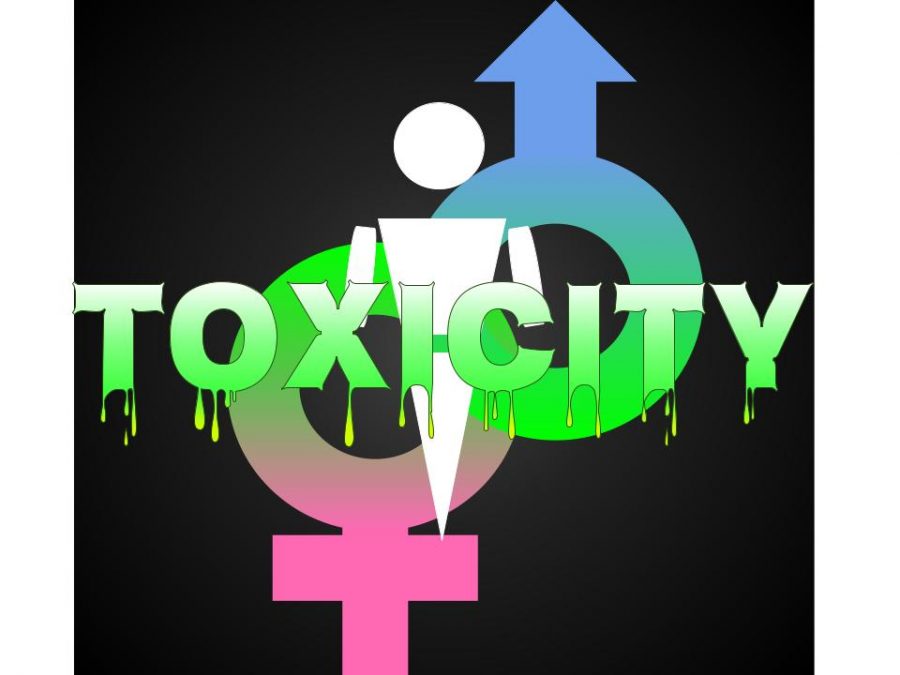Toxicity
Recent Stories
More stories from Emily Teismann
Toxic Masculinity and toxic femininity are both prevalent societal issues that need to be addressed.
Toxic Masculinity
Almost everyone is familiar with the term, but not all know what it means. Toxic masculinity refers to the cultural pressures that society places upon men to behave in a certain, often “traditional” way, and the notion that “manliness” is synonymous with domination, homophobia, and aggression. The phrase “boys will be boys” is a prime example of toxic masculinity as it negates consequences for a young male’s actions. Another example is “crying is for girls”, which establishes the idea that the male sex showing emotion is “feminine” and “weak”.
This is all very toxic, psychologically damaging behavior. Men tend to repress their emotions, rather than deal with them healthily. This contributes to why, in 2018, statistics found that men are 3.7 times more likely to commit suicide than women, according to the National Institute of Mental Health. Men also tend to seek help less than women,1.6 times less to be exact [according to the CDC], likely due to the behavioral standards placed upon them.
According to an NY Times article dubbed “Traditional Masculinity Can Hurt Boys, Say New A.P.A. Guidelines” that the American Psychological Association released, “boys and men are at a ‘disproportionate risk for school discipline, academic challenges and health disparities,’ including cardiovascular problems and substance abuse”. The APA also states that “men are overrepresented in prisons, are more likely than women to commit violent crimes, and are at greatest risk of being a victim of violent crime.”
Toxic Femininity
Unlike toxic masculinity, very few have heard of toxic femininity and even fewer know its meaning. Toxic femininity refers to traditionally feminine behavior, such as being quiet, subservient, and submissive, and encourages silent acceptance towards violence and domination. An example of this is the idea that a woman would only eat a salad and nothing else on a first date or that a young baby girl get her ears pierced so she looks “pretty” and “ornamented” or that a woman shouldn’t want to play a contact sport because they get sweaty and look unattractive in the uniform. This is no less as toxic, psychologically damaging behavior as behavior that falls under toxic masculinity is.
According to the National Institute of Mental Health, in the United States, it has been “reported that 85% of all violent crime experienced by women are cases of intimate partner violence, compared to 3% of violent crimes experienced by men”. The World Health Organization (WHO) “reports that the proportion of women who had ever experienced physical or sexual violence or both by an intimate partner ranged from 15% to 71%, with the majority between 29% and 62%”.
This stems from toxic masculinity, particularly the violent aspect that also considers femininity is equivalent to weakness. This also takes a mental toll on the victim. Many prefer not to discuss it, fearing the consequences of reporting the violence (like experiencing further harm from their partner) and the shame of being a “battered woman”. Others believe that they deserve the beatings because of “some wrongdoing on their part”, like not being good enough [National Institute of Mental Health].
What to Do…
Your first thought after reading the last two paragraphs is probably “well, ok, what do we do about it?”. And to that I say, there isn’t really a definitive answer. A combination of things need to be done: the first thing being educating others about the subject matter to bring awareness (the purpose of this article), the second being take the advice of N.W.A and “express yourself”, and the third and arguably the most important, respect and accept one another.
Guys, showing emotion is not weakness and being feminine is not bad. Masculinity is not about violence and domination. An excellent example of positive masculinity is Aragorn from the Lord of the Rings series. Masculinity is about being good and just, showing emotion, being brave, being determined and strong, being ambitious for the sake of others, being kind and respectful towards others (especially women) as well as having humility and tenderness, all of which Aragorn embodies. You can find a video on this on YouTube, titled “ARAGORN vs Toxic Masculinity” by Cinema Therapy. It is very enlightening. If you are depressed and feel like you would benefit from talking to someone (this goes for anyone), seek someone out [National Suicide Hotline: 800-273-8255. National Youth Crisis Hotline: 1-800-448-4663].
If you are experiencing any form of domestic violence, please seek help and call a hotline [1-800-799-7233]. You are allowed to speak up and be yourselves. You are not confined to being submissive and subservient as well as always being tough and unemotional, nor are you trapped with the only option being to accept the bad. You can have both masculine and feminine traits, regardless of your sex or gender. You can be brave, you can be determined as well as ambitious, you can be strong, and so many other things, it doesn’t matter who you are.



Brooklyn Johnston • Feb 3, 2021 at 5:54 PM
Thank you so much for writing something so true and real!!! People need to know about this and understand how wrong it is. I’ve experienced this myself and I know others who have as well. Great job!